Keeping Shavuot–The Feast of Weeks–Pentecost–Its Importance and Meaning to Messianic Believers Today
Keeping Shavuot-The Feast of Weeks-Pentecost-Its Importance and Meaning to Messianic Believers Today
For the Torah Observant Believer in Yeshua Messiah, Shavuot—The Feast of Weeks—Pentecost is about the giving and receiving of YHVH’s Torah and the establishing of the marriage covenant between YHVH and the Children of Israel. The Feast of Weeks is about the re-establishment of a broken covenant through the grace of YHVH and the outpouring of His Holy Spirit to aid fallen man in their keeping of the Creator’s instructions. Pentecost is about life and the establishing of the Body of Messiah through the atoning sacrifice of Yeshua Messiah and the infilling of the Holy Spirit.
What is Shavuot—The Feast of Weeks?
Shavuot is one of the seven-annual one of the 3-pilgrimage Feasts of YHVH. The instructions related to its keeping is found in the 23rd chapter of Leviticus. However, the origin of this set-apart day is founded upon the story behind the Creator’s giving of the commandments to the mixed multitude at the base of Mount Sinai as recorded in Exodus 19 through 24.
As the story goes, a mixed-multitude of souls, composed of the 12-tribes of Israel and various nationals from other nations, had escaped Egyptian-bondage roughly 50-days prior their settling at the base of Mount Sinai. YHVH, the Creator of the Universe, who bore this mixed multitude (with some estimates as high as 2 to 3-million souls) on eagles’ wings (Exodus 19:4) and brought them unto Himself. It was here and at this time that Father proposed a covenant between He and the Children of Israel that would be the shadow picture of an even greater covenant iteration in the years to come.
The 50-day trek from Egypt to Sinai foreshadowed the 50-day or 7-Sabbath Count (traditionally referred to as the Counting of the Omer) that begins at Wave Sheaf (i.e., Firstfruits) and culminates at Shavuot, also known as The Feast of Weeks and Pentecost in the Greek. (Read or listen to our discussion on the Day of Firstfruits.)
We find in Exodus 19 that Father proposes the establishment of a Covenant between He and Israel, whereby He would be Israel’s God and Israel would be His special and favored people above all the nation-people of the world (i.e., their Elohim) if they would hear His voice and obey His instructions (i.e., His commands). The Children of Israel agreed to the terns of this covenant and on that fateful day, at the foot of Mount Sinai, YHVH, in the midst of fire, lightening, smoke and loud shofar blowing, spoke His commandments directly to the people. Although the people were terrified by this indescribable manifestation, even to the point of demanding that YHVH speak exclusively through Moses to them so as to not repeat this terrifying manifestation, the covenant was ratified by the sprinkling of blood upon the written contract and upon the people.
A covenant is an official, established agreement between 2 or more interested parties. A blood covenant, which is what the Sinai Covenant was, required that both parties swear to abide by the terms of the contract. YHVH, because He is Creator and Elohim, certified His agreement to abide by the terms of the covenant (i.e., He would be the nation’s God and the people would reap the benefits of being a special possession of YHVH), simply by stating His Name—I am YHVH. Israel’s certification to abide by the terms of the contract was embodied in the nation’s collective, verbal affirmation that they would obey YHVH’s instructions and not worship or follow any other god. Thus, the contract—the covenant—was ratified and sealed by the sprinkling of blood upon the written contract and the people.
For all intents and purposes: this very first Shavuot was a marriage. This was a marriage between YHVH and the nation of Israel.
The Covenant is Broken
It was only but a short time after the ratification of the marriage agreement between Israel and YHVH that the people broke the covenant.
Because this was a blood covenant, if either party were to violate the terms of the contract, their life would be required of them. It goes without saying that YHVH could not—would not—violate the terms of the covenant. Israel, on the other hand, because they failed to have the Spirit of YHVH and His Torah (i.e., YHVH’s instructions) implanted in their hearts, returned to the worship of their Egyptian god (i.e., the Golden Calf) while Moses was attending to sacred business on the Holy Mountain (Exodus 32).
Despite the nation breaking the Sinai Covenant, the Almighty continued to honor the covenant. Israel cheated on her spouse YHVH. Yet YHVH did not put Israel, His bride away immediately; at least not until many centuries later when Israel delved so deep into idolatry that they could no longer hear the voice of YHVH and had completely turned their back upon their Elohim. That’s when YHVH divorced His bride Israel and the nation was left to suffer through a severe fracturing of the nation into two, followed by several usurpations, exiles and captivities at the hands of pagan nations and rulers.
The New (Renewed) Covenant
The Father knew that His people would break the marriage covenant from the very beginning. Thus, He set into motion a plan that would re-invigorate that broken covenant and re-establish the nation of Israel (both Houses of Israel—Judah and Israel) back to her favored state as His chosen people. This re-established covenant would be the Sinai Covenant on steroids. For not only would the Father bring back the original covenant to be followed by a reconstituted nation of Israel, it would be extended to the nation peoples of the world if they too agreed to the terms of the agreement. But Father did not stop there. Knowing the inherent problems His people originally had keeping His instructions, He would give His children the help they needed to keep His instructions and to ensure their success in staying in covenant with Him. This He would accomplished through the outpouring of His Holy Spirit upon His elect. Thus the Creator of the Universe’s presence would be within each one of His chosen people, and that Holy Spirit would inscribe Torah—Abba’s instructions—upon each and every heart and mind.
Of this New Covenant, the Prophet Jeremiah wrote:
“Behold, days are coming, declares YHVH, when I will make a new covenant with the house of Israel and with the house of Judah. Not like the covenant which I made with their fathers in the day I took them by the hand to bring them out of the land of Egypt. My covenant which they broke, although I was a husband to them, declares YHVH. But this is the covenant which I will make with the house of Israel after those days, declares YHVH. I will put My law within them and on their heart I will write it; and I will be their God, and they shall be my people” (Jeremiah 31:31-33; NASB).
This prophecy was confirmed by the Prophet Ezekiel who wrote:
“And I will give them one heart, and put a new spirit within them. And I will take the heart of stone out of their flesh and givem them a heart of flesh that they may walk in My statutes and keep MY ordinances and do them. Then they will be My people, and I shall be their God” (Ezekiel 11:19, 20).
Down Payment on the Renewed Covenant
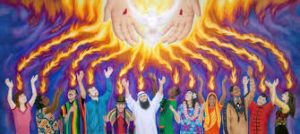
The giving of Torah at Mount Sinai was a shadow picture of the Day of Pentecost when YHVH’s Holy Spirit was poured out upon the disciples of Yeshua.
Although the New (or Renewed) Covenant has not been fully enacted, we saw the down-payment of it played out on the Temple Mount on Shavuot, just 10-days after Yahoshua commissioned His disciples on the Mount of Olives and then ascended up on high. On that fateful day, Pentecost 28 C.E., the Holy Spirit (i.e., the Ruach HaKodesh) was poured out upon the disciples of Yeshua who were attending Shavuot, gathered on the Temple Mount (Acts 2). This was the fulfillment of the “shadow picture” of the very first Shavuot at Mount Sinai. At the first Shavuot, YHVH gave the Children of Israel His Torah—His instructions—His commandments. On the Day of Pentecost in 28 C.E., YHVH gave the Children of Israel (i.e., the disciples of Yeshua HaMashiyach) His Holy Spirit. Thus we see how Torah became fully manifested and is Spirit within the people YHVH. At the time of the first Shavuot, 3,000 souls perished because Israel chose to break the covenant. At the time of Pentecost on the Temple Mount, 3,000-souls entered the Body of Messiah and into life eternal.
The Importance of Shavuot For Messianic Believers Today
Shavuot remains relevant to every Torah Observant Believer in Messiah today. Beyond the fact that we are commanded by YHVH to keep Shavuot (Leviticus 23:21, 22), we gain invaluable and crucial understanding of the New (Renewed) Covenant that Messianics are now privileged to be under. Shavuot is important in reminding Messianic Believers of the importance of keeping Torah and being in a right-relationship with the Creator of the Universe. Shavuot also serves as a prompt for every Torah Observant Believer to seek the leading and guidance of the Holy Spirit in their lives such that they live lives of their chosen status as Kings and Priests of YHVH Elohim. And Shavuot teaches the Messianic Believer that just mechanically keeping Torah is not to secure their place in the Kingdom of YHVH. Torah is Father’s house-rules that help us maintain a substantive relationship with Him. Admission into the Kingdom of YHVH is gained through the shed blood of YHVH, for salvation is a gift from Yah. YHVH’s Holy Spirit aids the believer in his/her keeping of the Creator’s house-rules in the midst of his/her living in this corrupt and dying world.
Shavuot then is about living the life that the Creator of the Universe always had in mind for His chosen people. Shavuot is living life in the Spirit.
Keeping Shavuot
The keeping of Shavuot by today’s Torah Observant Believer in Yeshua Messiah is pretty simple. We find in Leviticus 23: 21 that Messianics are to:
- Make a proclamation on Shavuot; such that believers are to extol the glories of the Creator and speak to others of YHVH’s Word.
- Have a holy convocation; such that believers come together (e.g., fellowships and congregations and assemblies) for the reading of Scripture and the breaking of bread.
- Perform or conduct no servile or laborious work.
With the Temple in Jerusalem no longer in existence, Messianics can not truly keep Shavuot as one of the 3-pilgrimage Feasts of YHVH and as instructed in Torah (Exodus 23:14-17; Deuteronomy 16:16). However, under the auspices of the renewed covenant, the believers’ bodies have replaced the Temple proper as the dwelling place of YHVH (1 Corinthians 3:16; 6:19). Thus, wherever 2 or 3 have gathered together in their Master’s Name, there He will be in their midst (Matthew 18:20).
Thus every Torah Observant Believer in Yahoshua Messiah is obliged to keep Shavuot in Spirit and in Truth. The actual method for keeping the Feast of Weeks is strictly between the individual believer and YHVH (Colossians 2:16, 17; Romans 14:5).
Faithfully,
Rod and Hilary
The Gospel According to the Apostle Paul
Our New Challenging Pauline Passage--Romans 2:16--A Seemingly Bold and Curt Statement From the Apostle. Our focus passage, or more precisely, our focus verse today is Romans 2:16. And we find when we read this verse a rather bold and seemingly curt statement...
Are You Under the Law? Part 4 of the Paul on Being Under the Law Series
A Culmination of the Previous 3-Installments Today's discussion is a culmination of the previous 3-installments of this series within a series where we'll finally answer the question: What did Paul mean by one who is under the Law as mentioned in Romans 6:14-15. And...
Paul on Being Under the Law Part 3–Keeping Passover 2021 and Sin Consciousness
1 Corinthians 5:7-Get rid of the old hametz, so that you can be a new batch of dough, because in reality you are unleavened. For our Pesach lamb, the Messiah, has been sacrificed (CJB). Yeshua is our Pesach How appropriate for this time of year wouldn't you say. And...
Paul on Being Under the Law-Part 2-Torah Meets Grace
Goal What I would like to do in today's installment of TMTO is to lay the ground-work or set-the table if you will in our gaining as complete an understanding of what the Apostle Shaul (aka the Apostle Paul) meant when he wrote to his Roman Messianic readers that "sin...
Torah Readings and Studies-Deuteronomy 13–Beware of False Prophets
Prophets That Enticed Departure From Covenant A most timely Torah Reading this past Sabbath I must say: Deuteronomy 13:1-5, which addressed the issue of false prophets amongst Yah's set-apart people. This mitzvah (or commandment) was not so much against those who...
The False Hope of Imitation Christianity
If you've been called and chosen, this message is for you. But it's not for everybody. Questions: What does John 8:32?--You shall know the Truth and the Truth shall set you free. We are to get our information from Scripture. Do you know what you worship? What's the...
Overcoming Obstacles to Faith-Part 3-Learning From Ancient Israel’s Mistakes of Not Finding Contentment
Picking-up From Part 2 of the Series My goal in this message is to pick-up where I left off from my previous two messages on overcoming obstacles to belief. Quick Review of Parts 1 and 2 In Part 1 of this series, we looked at overcoming...
Overcoming Obstacles to Belief Part 2-Learning From Ancient Israel’s Mistakes of Murmuring/Complaining
Goal: Last week I presented to you an overview of the important differences that exists between believing IN YHVH verses believing YHVH and how life can and does create obstacles to our believing Yah. Also recall that I discussed two behaviors that proved to...
Overcoming Obstacles to Belief–Part 1: Learning From Ancient Israel’s Mistakes
Goal: What I intend to address in my message today is something that I believe is crucial for our (1) making it into the Kingdom of Yah; (2) successfully walking out our Faith in Spirit and in Truth; and (3) living the life abundant that Yeshua our Master...
Should Messianic Torah Observers Keep Thanksgiving? The Re-Broadcast
Should Messianic Torah Observers Keep Thanksgiving? In this installment, we reflect upon Torah-Keeping Believers in Yeshua celebrating Thanksgiving: Is it a terrible reminder of genocide that New World Settlers brought upon Native American Indigenous Peoples, or a day...
Lashon Hara-The Sin You Never Knew You Were Committing-Torah Reading Numbers 12:1-15
Verse-by-Verse Discussion Miriam and Aharon Engage in Subversive Conversation Verse 1—Two of Moshe's family members, Miriam and Aharon, engaged in some subversive conversation against Moshe. Moshe apparently married an Ethiopian woman which seemed to outrage the...
Finding Contentment in our Faith–Torah Reading-Numbers 11:1-35
Finding Contentment in our Faith--Torah Reading--Numbers 11:1-35 Verse 1--The peoples' complaining or murmuring (complaining about their hardships openly in Taberah or The Place of Burning) displeased Yah which led to His wrath coming down upon the people...
What Did Paul Mean by Being Under the Law–Part 1
Goal of this Post “For Yah shows no partiality (that is, Yah shows no favoritism). For all who have sinned without the law will also perish without the law, and all who have sinned under the law will be judged by the law. For it is not the hearers of the law who are...
Paul and the LGBTQ Community–A Messianic Perspective
The Indictment Against Homosexuality In our ongoing quest to untangle and clarify some of the more difficult and challenging Pauline writings, (of late making our way through the Book of Romans), I want to next tackle Romans 1:26-27. Now, most of us should be...
Feast of Tabernacles and the Kingdom of God in You
The Feast of Tabernacles and the Kingdom of God (of Yah) in You My goal in delivering this discussion to you here today is to communicate to you another way of looking at and understanding the Kingdom of Yah. Another perspective. Another angle. Another Truth....
Yom Kippur (Day of Atonement)–A Messianic Torah Observer Perspective
Introducing Yom HaKippurim (aka, Yom Kippur or the Day of Atonement) Instead of trying to figure out what the Day of Atonement/Yom Kippur/Yom HaKippurim is about through hearsay, public discourse or opinion, what do you say we delve into the riches of Torah to get...
Yom Teruah’s Greatest Truths and Mysteries (Revealed)
Yom Teruah's Greatest Truths and Mysteries (Revealed) Today I want to expand our understanding of Yom Teruah (aka The Day of the Blowing of Trumpets or simply the Day of Trumpets) from the day being just another one of the 7-annual Feasts of YHVH; just that...
Polygamy and the Bible–A Messianic Perspective
My Interest Piqued In my studies of this past week’s Torah Reading, I was drawn to Deuteronomy 21:15-17. Many modern English bibles generally entitle this passage something akin to “The Right of the Firstborn.” That being said, this short passage really is about the...
Picking Up and Moving Forward With TMTO
Update on TMTO (Special post without any fanfare and promotion)--Where we are today and where we'll be going. Discontinuing Live-Stream and Why. The failure of the Livestream. Non-committal group of individuals. Newsletter failures. Loss of focus on the original...
Torah Reading 48–Shofetim–Judges–Reading Outline
This week's Torah Reading is contained within Deuteronomy 16:1--21:9 and is entitled Shofetim. In English, Shofetim means Judges. If one were summarize the content of this reading I guess it could be described as a discussion of Yah's established civil...
The Righteousness of God Revealed From Faith to Faith—Its True Meaning and Reality for God’s People
Today’s discussion is entitled, “The Righteousness of God Revealed From Faith to Faith—Its True Meaning and Reality for God’s People.” Why The Church Loves This Romans 1:17 Fundamentalists; traditionalists; and evangelicals absolutely love this passage. Why? Because...
Jews Before Gentiles?
Today’s discussion is entitled, “Jews Before Gentiles? How Does that Work?” And the biblical basis for our discussion this evening is found in Romans 1:16 which reads: 16 For I am not ashamed of the gospel of Christ: for it is the power of God unto salvation...
Torah Reading 46–Ekev (Because)–A Focus on the Kingdom of God
Highlights and Comments Shalom Saints. This week's Torah Reading is entitled, "Ekev," or "Because." The portion covers Deuteronomy 7:12-11:25. I wish to share with you some of my thoughts and reflections on the many life truths that I drew from my study of this...
To Whom Do You Pray?
Who do you pray to and worship and give thanks? Yeshua? YHVH? Both? Is it Biblical to pray to and worship Yeshua as so many Christians routinely do? In this installment of the Messianic Torah Observer, we will continue our review of the Book of Romans and Paul's...
Messianic Sainthood–Paul and the Book of Romans
Paul Calls His Roman Readers Saints. What Gives? Our next challenging Pauline passage of the Book of Romans is found in chapter 1 verse 7 and it reads as such: "To all those in Rome who are loved by G-d and called to be saints: Grace to you and peace from G-d our...
Chevra Kadisha-Honoring the Jewish Dead
An Intriguing Article I recently became intrigued by an article I came across on the "My Jewish Learning" website. The article was entitled: "Chevra Kadisha or Jewish Burial Society." It was written by a Rabbi Joseph Telushkin. And yes: I do from time to time visit...
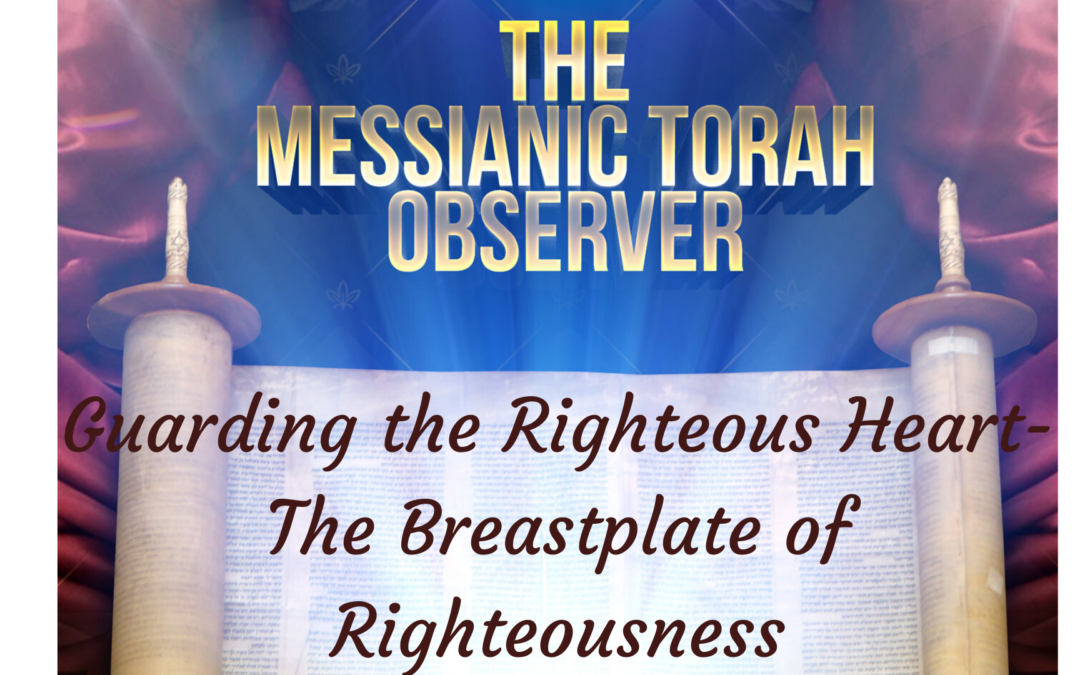
Guarding the Righteous Heart–The Breastplate of Righteousness–Paul and Hebrew Roots Series
How does the Child of Yah put on and use the Breastplate of Righteousness? Yeshua taught us how and we discuss in detail how to don and use this vital piece of spiritual armor: The Breastplate of Righteousness.
Putting on God’s Image-The Belt of Truth-Part 1 of the Armor of God Series
Ephesians 6:11-18—The Armor of Yah Famous passage of Scripture that most evangelical and fundamental Christians know and understand from a denominational standpoint. In fact, whole ministries have been launched and based upon this passage alone. And the focus seems...
Living the Life of a Priest of God–Yeshua-focused Torah Discussion–Torah Reading 91
Living the Life of a Priest of God (of Yah)--Torah Reading 91 Leviticus 21 Ezekiel 44:25-31 Luke 11:30-44 ________________________________________________________ Leviticus 21--Section Verse Study--Laws Concerning the Levitical Priests Know that you are special in...
Is Torah-Keeping Necessary For Salvation?
This week’s Torah Reading is about the Holiness Codes that Father provided to the Hebrews in order that they be set-apart from the nations of the world. These holiness codes remain in effect for every disciple of Yeshua and are of salvific expediency.
Obedience Versus Faith–Paul and the Book of Romans Series
Link to My Post Entitled: Messianic Duty During Times of Global Crises. This is Obedience Versus Faith--Part 18 of Our Paul and Hebrew Roots Series In preparing to discuss our next challenging Romans’ passage—1:16—I happened upon 1:5: an equally challenging passage...
Torah’s Forbidden Sexual Relationships-Yeshua-Focused Torah Studies–Torah Reading 89–Leviticus 18
This is Torah's Forbidden Sexual Relationships--Yeshua-Focused Torah Studies-Torah Reading -89--Leviticus 18 The underlying theme of our Torah Reading this Shabbat is Sanctification: Being Sanctified unto YHVH. Sanctification is that internal, spiritual...
Animal-Blood-Sacrifices–Torah Reading 88–Leviticus 17:1-16
Animal-Blood-Sacrifices Leviticus 17:1-16 Unpack this Torah Reading Verses 3-4 Prohibition against the slaughter of domesticated animals outside the Tabernacle System. The English term "kill" in Hebrew is SHACHAT {Shaw-Khat} which is rendered slaughter in...
The Book of Romans and the Gospel of God-Part 17 of the Paul and Hebrew Roots Series
Goal: This is “The Book of Romans and the Gospel of God—Part 17 of our Paul and Hebrew Roots Series.” Today we will begin our extensive study of the many challenging Book to the Romans passages by examining one of Shaul/Paul’s foundational doctrines....
The Day of Atonement-Yom Kippur-Torah Reading for 6-6-2020
Parashah 87--Leviticus 16:1-34--Day of Atonement-Yom Kippur-Torah Reading for 6-6-2020 Father Affirms and Enforces His Holiness (vss. 1 & 2) The transgression of Nadab and Abihu (Leviticus 10) led to Abba re-affirming that the Holy of Holies was not a place...
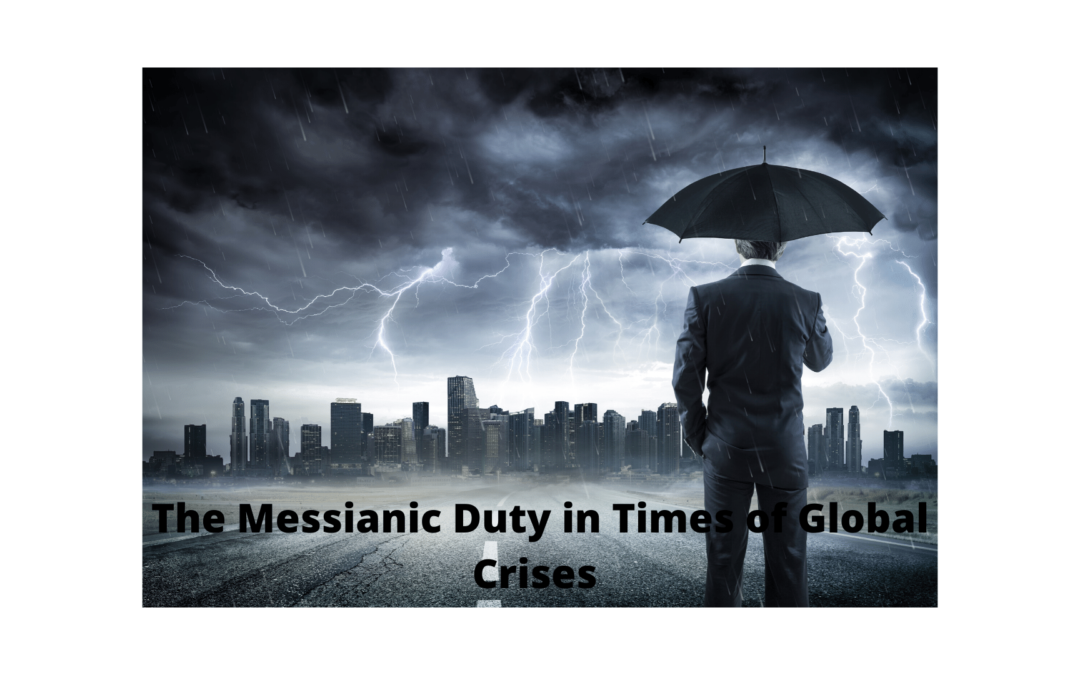
The Messianic Duty in Times of Global Crises
Given all the chaos and turmoil that is ongoing in the world today, I was led to talk to you today about duty. Specifically the Messianic duty in the midst of global chaos. Are we as Messianics required to put our two-cents towards fixing the clobal crises that are...
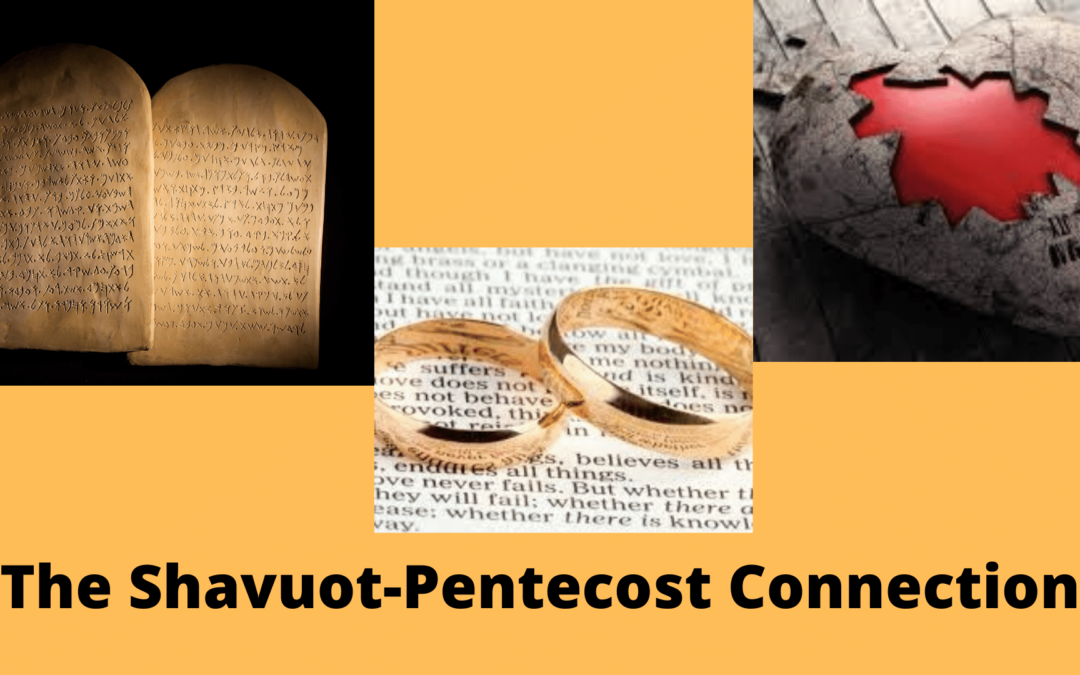
The Shavuot-Pentecost Connection
Two-Competing Schools of Thought Regarding Shavuot and Pentecost When we talk about Shavuot and or Pentecost there are essentially two-prevailing schools of thought and understanding. Interestingly, these two schools or lines of thought are often at odds with one...
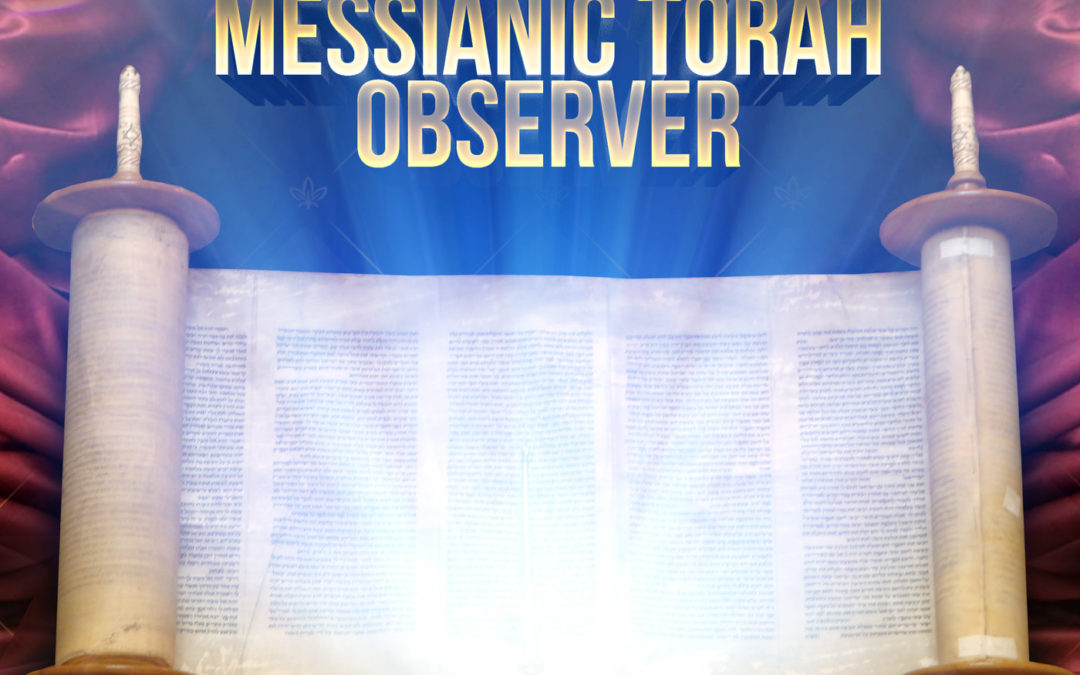
Shavuot 2020-When is It? How Did We Arrive at the Date? Do We Still Keep It ?
Explanation for this post As I record and post this installment of TMTO we are on the 4th day of the 3rd Month of the Creator's Calendar Year according to the observational calendar and the 5th day of the Month Sivan according to the Hillel's calculated...
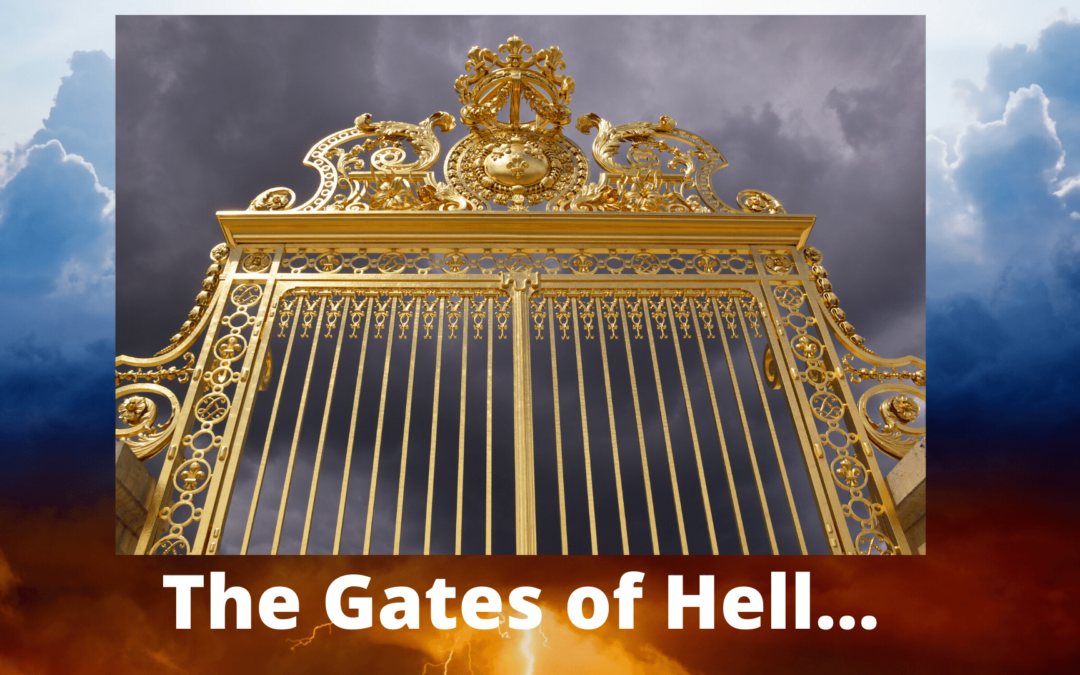
The Gates of Hell
The Gates of Hell Today I want to discuss the enemy’s goal to destroy and hinder the Creator's Plan of Redemption, Restoration and Salvation. It will become the purpose of this discussion to examine how the enemy was defeated by Master Yahoshua (Yeshua) Messiah and to...
The Book of Romans-To Whom Was It Written?
Our Purpose for This Post To whom was the Book of Romans Written? We know quite a bit about the author. But we may not know much about the so-called Romans or the Roman Church. Unfortunately, our understanding of who they are may be influenced by our...
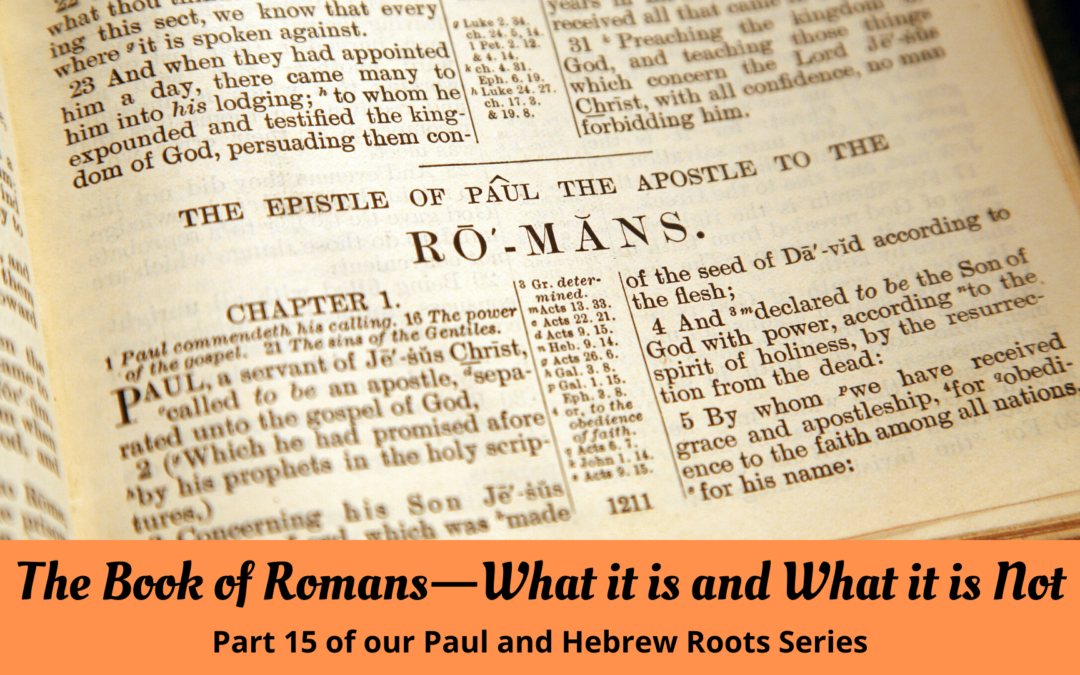
The Book of Romans-What it is and What it is Not–Part 15 of the Paul and Hebrew Roots Series
In this installment we resume our Paul and Hebrew Roots Series with a brief introduction to the Book of Romans. We discuss what the Book of Romans is, and what it is not.
The Niddah Laws–Still in Effect Today ?
The Question of Niddah One question that seems to pop-up a lot from members of our Faith Community has to do with the Laws related to Niddah. Are the laws of Niddah still valid for today’s Torah Observant Disciples of Yeshua Messiah? And in case you aren’t familiar...

Mark of the Beast: What Are You Going To Do When They Come For You?
The world’s power-brokers are suggesting implementing a tracking mark to distinguish those immune to the current virus from those not. Mark of the Beast? What will you do when they come for you?
The Feast of Unleavened Bread: A Ridiculously Long Week
My Struggle With Time One of the many things I struggle with in this life is the issue of time.Time is an enemy. It is often stressful. There never seems to be enough of it to go around. Time moves by so swiftly. And I often find myself fearful of wasting it; losing...
Our First Passover–An Overview of the First Passover Exodus Chapters 1 through 12
Exodus 1 70 blood relative of Jacob enter Egypt-->Joseph dies as well as the Patriarchs. Israelites grow in number. A pharaoh who did not know Joseph enslaves the Hebrews, yet the Hebrews flourish in number. Pharaoh orders every male infant be cast into the...
Sins Committed by Mistakes are Still Sins–Torah Reading 77
Vayikra 4:1-35; Ezekiel 18:1-18 Revelation 5:6-10 Unintentional Sins Unintentional sin may be better defined as acts of unfaithfulness; sins committed without knowledge; or sins resulting from carelessness (such as manslaughter that may result in the guilty person...
Rosh Hashanah Happy Biblical New Year and Guarding the Month Aviv
The Command to Guard the Month of the Aviv First Day of the Month of the Aviv and the head of the Biblical New Year--Rosh Hashanah; Month of Nisan in Jewish circles. We must first understand what it is we're guarding. Why is it important? What it's composed of. We...
The Coronavirus Pandemic in Relation to God’s People
Fear and uncertainty has gripped the world. Widespread infections (Italy just announced 600+ deaths in one day; politicians and celebrities infected) Civil liberties are at risk of being severely curtailed or eliminated altogether. Personal and business incomes and...
The Brazen Laver–The Anointing Oil–Sacred Perfume–Messianic Reflections on Torah Reading 68
The Brazen Laver The Brazen Laver would sit between the Tabernacle and Brazen Altar. The Levitical Priests would be required to wash their hands and feet prior to entering the Tabernacle or facilitating/tending to the sacrificial offerings on the Brazen Altar...
The Significance of the Half-Shekel Ransom Offering to Messianics Today–Reflections on Torah Reading #68
The commandment given to the Hebrews by YHVH that they give a half-shekel ransom offering at the time of census holds tremendous prophetic and spiritual significance for today’s Messianic.
Living Deceptively in the Service of God Results in Shame and Disgrace All Around–Reflections on Malachi 1:11-2:7
YHVH Outs His Chosen Ones Because the nation had despised the true worship of YHVH, YHVH Tzva'ot informed the Hebrews that their failure to properly worship Him as He had prescribed would not be ignored. Despite the people's outward deceptiveness in worship of YHVH,...
The Golden Altar of Incense–The Ministries of Yeshua Messiah and the Prayers of the Saints–Torah Reading 67
Welcome back my friend to our discussion on this week’s Torah Reading from the Triennial Torah Reading cycle. This week’s reading is found in Shemot (Exodus) 30:1-10. I’ve entitled this study: “The Golden Altar of Incense--The Heavenly Ministry of Yeshua Messiah and...
Plans for Consecrating the Levitical Priesthood and What it Means to Messianics Today
The consecration of the Levitical Priesthood as featured in this week’s Torah Reading foreshadowed the role we–Messianics-are appointed to fulfill as Melchizedekian Priests under the High Priesthood of Yeshua Messiah.
Reflections on Torah Reading 65–The Garments of the Levitical Priests
Parashah 65--"You are to order…"--Shemot 27:20-28:43 Focus Must Guide Our Study of Torah As with any study of Torah, the true disciple of Y’shua haMashiyach considers the contents contained therein from a Messianic—Yeshua-centric—Yeshua-focused perspective. How do we...
Can Messianics Attend Same-Sex Weddings and Similar Social Events?
Often we’re asked to attend same-sex weddings and similar social events. But are we permitted to attend and participate in such social activities as disciples of Yeshua Messiah? We discuss this critical issue in this installment of TMTO.
Praying in the Spirit-Part-3 of a Series on Messianic Prayer Life
Shalom Saints! In today’s post, we’re going to look at a central Truth or component to effectual prayer. And that central Truth of effectual prayer has to do with “Praying in the Spirit.”
Fashioning the Elements of the Tabernacle-Torah Reading 64 (Triennial Reading Cycle)
This week’s Torah Reading/Portion, #64, focused on the elements of the Tabernacle. We examine those elements from its Messiah/Mashiyach foreshadowing.
Hanukkah and the Torah Observant Believer in Yeshua Messiah Recast
A Recast of a Previously Published Discussion on Hanukkah and the Torah Observant Believer in Yeshua Messiah Today's installment of TMTO will be, what I will call, a "recast." It's a "recasting" or a "re-purposing" of a previous posting I did regarding Hanukkah. As...
The Book of the Covenant Versus Book of the Law Controversy–A Study of Torah Reading 62
In this study of Torah Reading 62, we examine the Book of the Law versus Book of the Covenant Controversy that has made its way through the Hebrew Roots and Messianic Community.
Usury-Interest According to God (YHVH)
The Practice of Usury Prohibited How does God/YHVH rule on the practice of usury or exacting of interest on monetary loans by His elect? We find in Torah Reading 61 (according to our “triennial reading cycle-- Torah Reading 61--Exodus 22:25-31 ) the prohibition...
The Critical Role Faith Play in the Prayer Life of a Messianic
The prayer lives of many members in the Hebrew Roots-Messianic Community are ineffective and have little to no associated power. In this installment of TMTO, we look at the role faith places in a Netzari’s prayer life and how faith can transform our prayers, when properly aligned with God’s Word and His Holy Spirit, into a powerful and effective tool for the Body of Messiah.
Constancy-Persistence-Ceaselessness in Prayer
Are our prayers as effective as they should be? We discuss one of the critical-crucial elements of effective prayer-constancy-persistence-ceaselessness in prayer.

Cooking on the Sabbath-Is It Allowed ?
Was God’s commandment that the Hebrews not go out to gather manna on the Sabbath a prohibition against cooking on the Sabbath?
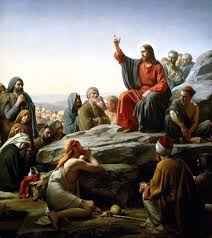
Seek Ye First The Kingdom of God And…
Yeshua instructed us to pursue those things that qualifies one to receive and enter the Kingdom of God and the righteousness of YHVH our Elohim. So how does Torah-keeping fit in with Yeshua’s instruction?

Torah Portions-The Many Types and Patterns of Torah
Returning from the Fall Feasts, we anxiously launch into a new season. Today we examine the two predominant-types of Torah Portions followed by Hebrew Rooters; I reflect upon our 2019 Sukkot experiences; and we examine some patterns and types found in Torah.
Preparing for the Feasts of God-2019–The Connection Between Grace and the Fall Feasts
As we approach the Fall Feasts of 2019, we are compelled to prepare spiritually and physically for each Feast’s arrival. In this discussion of the Fall Feasts, we discuss the connection between God’s grace and His Fall Feasts.
Paul’s Bold Stand Against Anti-Torah Teachings in the Ephesian Church—Part 15 of the Paul and Hebrew Roots Series
Why did Paul insert the creation story and the fall of man into 1 Timothy? Was it, as convention erroneously teaches, the reason women must not teach and preach in the Church? The answer to this question will shock you and cause you to appreciate battle Paul faced against Gnosticism in the Ephesian Assemblies of Messiah. This is Part 15 of our Paul and Hebrew Roots Series.
Paul Never Prohibited Women Teaching and Preaching in Church–Part-14 of the Paul and Hebrew Roots Series
The so-called Church over the centuries has used 1 Timothy 2:11&12 as the basis for their imposed prohibition against women teachers and preachers in the Body of Messiah. But we will show that his passage in no way prohibits women from fulfilling their call and giftings in the Body and Assemblies of Messiah.
First-Timothy—Paul’s Inconsistencies—Myths-Tales-Torah—Part-13 of the Paul and Hebrew Roots Series
In continuing our Paul and Hebrew Roots series, we look at seeming inconsistencies in Paul’s writings as well as examine the role myths and tales played in the teaching of Torah in the Ephesian Assemblies.
Modern Day Idolatry-God Approved Foods-Torah Keeping-Tithing–Reflections on Torah Portion Re’ eh
This week’s Torah Portion entitled ‘Re’eh’ is a rough sketch of the inner workings of the Kingdom of God: no idolatry-proper foods-the keeping of Torah-giving of Tithes–As we prepare to possess the Land of Promise.
Obedience to Torah-Marked for Destruction-The Wisdom of Wearing Phylacteries-Reflections on Torah Portion ‘Ekev
In this installment of TMTO, we reflect upon Torah Portion ‘Ekev–highlighting the importance of obedience to Torah–what nations were marked for destruction by YHVH and why–and the wisdom of wearing phylacteries by Torah observant believers in Yeshua Messiah.
1 Timothy-The Properly Attired Praying Woman-Part-12 of our Paul and Hebrew Roots Series
In this installment of our Paul and Hebrew Roots series, we consider Paul’s instructions regarding properly attired praying woman. We explore the significance of prayer in the early Church and the fact that Paul sought to use prayer as one of his first tactics against the scourge of early Gnosticism that had infiltrated the Ephesian assemblies of Messianic Believers. And we find clearly layed out in 1 Timothy that Paul advocated women leading worship and corporate prayer in the assemblies. Shalom and welcome.
First Timothy-Paul’s War Strategy Against Gnosticism-Part-11 of the Paul and Hebrew Roots Series
“As I counseled you when I was leaving Macedonia, stay on in Ephesus, so that you may order certain people who are teaching a different doctrine to stop. Have them stop devoting their attention to myths and never-ending genealogies; these divert people to speculating...
Let the Woman Learn in Silence-The Problem With First Timothy-Part 10 of the Paul and Hebrew Roots Series
1 Timothy 2:9-15 has been used by churchianity for years to prohibit women of Faith from doing what they were called to do. In this 10th installment of our Paul and Hebrew Roots series we dispel this false practice and understanding by examining the Truth of what Paul was truly saying in his letter to Timothy.
Phineas’ Covenant of Peace—Our Road Map to Peace in Messiah—Reflections on Torah Portion Pinchas
Peace is the birthright of every disciple of Y’shua Messiah. Yet so many of us lack true peace in our lives. What if I tell you that this week’s Torah Portion Pinchas provides a road map to peace in Messiah? Would you be interested? Come and let us reason together in the Word of our Elohim. Shalom and welcome.
Social Media and Hebrew Roots-A Warning to Discern Who’s Who in the Social Media Zoo
Most of us who are members of the True Faith Once Delivered, have one or more social media accounts. Many of us share our Faith convictions and or even minister on these platforms. But Social Media, like Hebrew Roots, can be likened to the Americana images of the...
A Little Balaam in Each of Us–Reflections on Torah Portion Balak
Can the character and principles of the prophet for profit Balaam be found in each of us. You may be surprised at what Scripture has to say about that. Welcome to The Messianic Torah observer and our reflections on Torah Portion Balak. Shalom and welcome.
Pray For The Peace of Jerusalem-Part 3 of the Love or Hate Israel Series
What does it mean to pray for the peace of Israel? We discuss also Israel in terms of her covenant-relation with God as well as her significance in end times prophecy.
Rebels in the Congregation-Reflections on Torah Portion Korah
As we examine Torah Portion Korah we learn about the potentially rebellious condition of our hearts; the importance of living holy lives; and the dangers of false teachers and their teachings to the Body of Messiah.
One Law For All–Reflections on Torah Portion Shelach Lekha
The Giver of Torah-YHVH-clearly stated that Torah was for all who would attach themselves to the commonwealth of Israel and live according to the Way He prescribed for men and women to live. Yet many within and without our Faith Community teach otherwise--that Torah...
Messianics—Modern Day Levites—Separated for Service to God—Thoughts and Reflections on Torah Portion Behaalosecha
This week’s Torah Portion-Behaalosecha-foreshadows a great many spiritual elements necessary for our service to the Kingdom of God. In a sense we are modern day Levites. We have been separated from all the nations people of the world unto God for His service. Are we up for the challenge? This is a wake-up call to the Body of Messiah to take immediate action.
Israel: To Love or Hate Her—That is the Question—Part 2–A Biblical and Personal Perspective on the Significance of Physical Israel
In this 2nd Part to our Israel: To Love or Hate Series, we continue our analysis of some the most common reasons people reject physical Israel today. As well as we consider some of the miracles said to have resulted in Israel’s deliverance from certain destruction. And lastly we consider the problems associated with the nation state of Israel. Shalom and welcome.
Burdens and Service-Thoughts and Reflections on Parashot Naso-Lift Up
Lessons of bearing burdens and service to YHVH are embodied in this week’s Torah Portion Naso. As disciples of Messiah, we are compelled to serve and bear burdens as we discuss in this post.
5-Facts About Pentecost [Shavuot] Every True Disciple of Messiah Should Know
As the Day of Pentecost (aka, Shavuot) descends upon many of us who are of Faith in the coming days, we reflectively prepare for the Day. With that preparing in mind, today I will reveal 5-things every spirit-filled disciple of Yeshua Messiah should know about Shavuot—Pentecost.
To Love Or Not Love Israel?That is the Question–Part 1
As Yeshua-focused Torah Keepers, how are we to view physical Israel? We discuss this polarizing issue from a historic, biblical and personal perspective. Shalom and welcome.
Shemittah and Jubilee-Shadows of the Rest, Redemption and Freedom We Have in Messiah
This week’s Torah Reading/Portion entitled B’Har is a message of the rest, redemption and freedom we have in Y’shua Messiah.
10-Things You Must Do To Improve Your Understanding of the Bible
In this installment of TMTO, I outline 10-things you can put into practice today that will drastically improve your understanding of the Bible.
Being Holy in the Midst of an Evil and Adulterous Generation
This week’s Torah Portion was timely indeed. As we are presently living in perilous times, this week’s Torah Portion challenges us to live holy lives in Messiah. We explore what it means and how to live holy lives.
Passover and the Feast of Unleavened Bread Replay
In light of this weekend’s Passover observance and our week’s longing keeping of the Feast of Unleavened Bread, I elected to repost a teaching I posted last year on Passover and the Feast of Unleavened Bread. Chag Pesach Sameach. Shalom.
Keeping God’s (Yehovah’s) Feasts
I give an overview of the Creator’s Feasts by discussing why we keep them; when we keep them and what they mean. Shalom and welcome.
M’tzora-Person Afflicted With Leprosy-Torah Portion 28-Commentary
Parashah 28-M'tzoro--Person Afflicted With Tzara'at Continuation This week's Torah Portion/Reading entitled "M'tzoro," or a "Person Afflicted with Tzara'at (Leprosy)" is somewhat of a continuation of last week's reading (ie., Tazaria) that dealt with the diagnosis and...
Tazria (She Conceives)-Leprosy, A Shadow of Sin and the Healing Work of Messiah–Parashah-27
In this week’s Torah Portion entitled Tazria, we consider the spiritual applications of leprosy.
How to Keep (Guard) the Month of the Aviv–Replay
In this replay of a past episode, we discuss how to keep–how to guard the Month of the Aviv. Happy New Year! Shalom.
Irresistible Holiness-Torah Portion-26-Eighth-Shi’mini–TMTO-23
What Father is essentially saying here to us through this shadow picture—this lesson—this Torah Portion—is, “Look, I’m going to get the glory and my holiness is going to be proclaimed and demonstrated to all the world. Now this can be done by and through your actions of obedience and worship of me. And if you choose to glorify me and extol the virtues of my holiness to the world, you’re going to have to do it my way. For if you don’t choose to do it my way, then I’m still going to get the glory and my holiness will be demonstrated and manifested through my chastising of you. You see, it’s going to be done my way; or it’s going to be done my way. Either way, I’m going to be glorified and deemed holy to all the world.”
Torah Portion 25–Give An Order–A Call To Worship
This week’s Torah Reading-Parashah-25–dealt with sacrifices and offerings. These were shadows of our worship of Father in Spirit and in Truth.
Let Your Women Keep Silence in the Church–Part-9 of the Paul and Hebrew Roots Series
We break down 1 Corinthians 14:34-35 to determine what Paul really meant when he instructed that the Corinthian women keep silence in the church.
Patterns of Evidence-The Moses Controversy Film Review
In this 21st installment of The Messianic Torah Observer, I review Tim Mahoney’s newest documentary, “Patterns of Evidence-The Moses Controversy.”
Thoughts and Reflections on Torah Reading Pedudei-Accounting Of
This week's Torah Reading entitled Pedudei (ie., Accounting Of) focused on worship. The reading consisted of Leviticus 1:1 to Lev. 5:6:7. The Haftorah consisted of Isaiah 43:21-44:23. Specifics of Worship That which was given to us by Abba related to worship...
TMTO-20-Endure Sound Doctrine I Will Not
Many members of the Body of Messiah will not endure sound doctrine as they are being led astray by false teachers or they themselves are teaching false doctrine. We discuss this troubling situation and provide ways to overcome the deception.
The Un-Silenced Women of Paul’s Ministry-Part 8 of the Paul and Hebrew Roots Series
Many female leaders were associated with the Apostle Paul’s ministry. We highlight some of those great first-century women of the Body of Messiah.

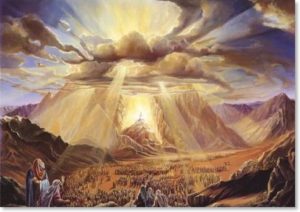

0 Comments